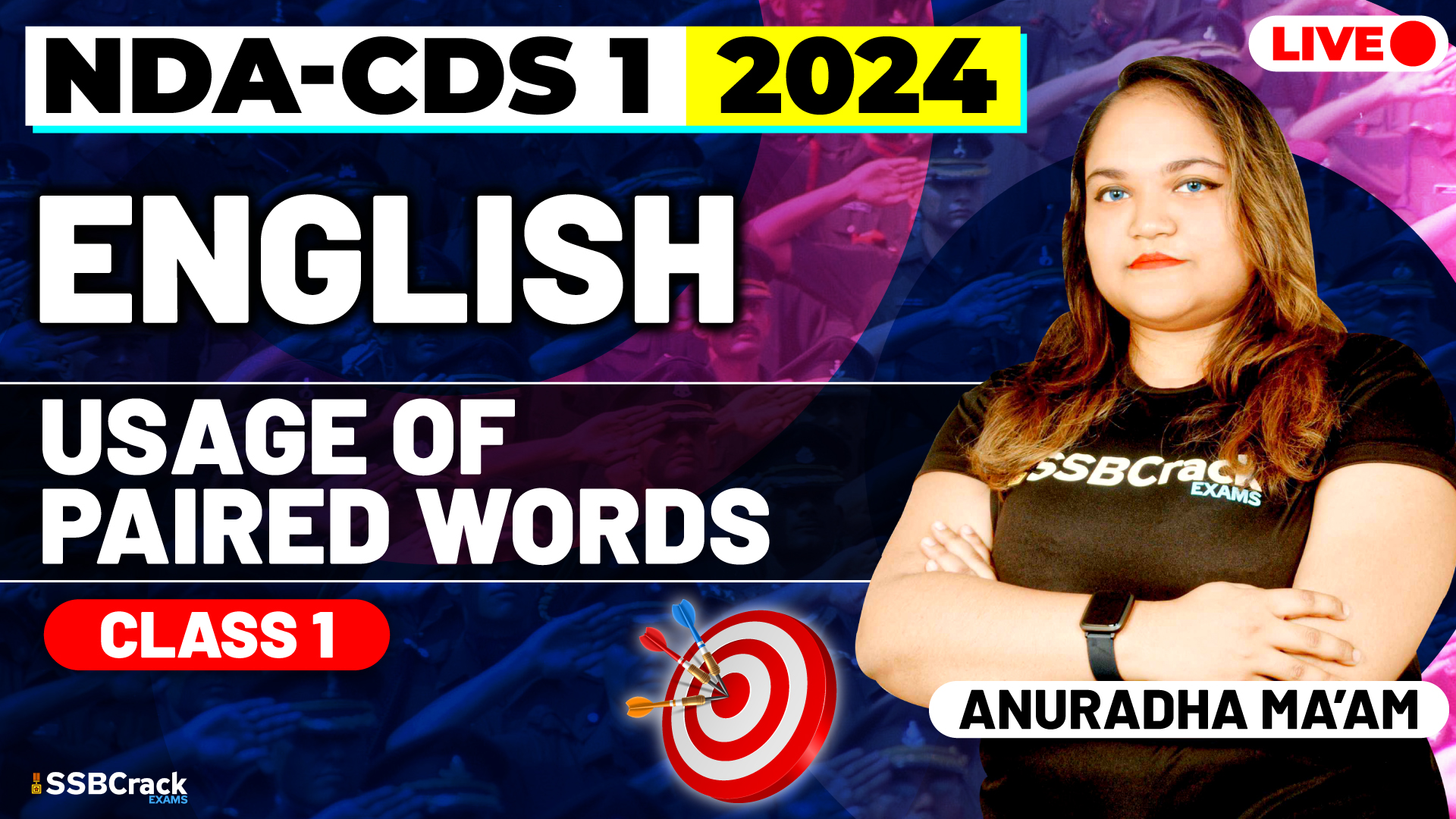The English section of the NDA (National Defence Academy) and CDS (Combined Defence Services) examinations is a crucial part of the selection process, evaluating candidates’ language proficiency, communication skills, and understanding of grammatical nuances. A relatively recent addition to the English syllabus is the “Usage of Paired Words” topic. In this article, we will delve into the importance of this topic, strategies for preparation, and tips for solving questions effectively.
Directions: In the following questions a pair of similar sounding words is provided. You are required to select the option that most appropriately describes the meaning of both the words and mark your response on the Answer Sheet accordingly.
Q) Resign and Re-sign
(a) Resign means to leave and Re-sign means to play
(b) Resign means to quit your job and Re-sign means to sign a contract again
(c) Resign to built and Re-sign means to scribble something
(d) Resign means to intrude on something and Re-sign means to dwell on something
Ans. (b)
Q) Immolate and Emulate
(a) Immolate means to sacrifice and Emulate means to follow someone out of admiration
(b) Immolate means to burn and Emulate means to wear ornaments
(c) Immolate means to burn and Emulate means to simulate
(d) Immolate means to destroy and Emulate means to imitate
Ans. (a)
Q) Emigrate and Immigrate
(a)Emigrate means to illegally go to another country and Immigrate means to arrive at another country
(b)Emigrate means to arrive at another country and Immigrate means to leave for another country
(c)Emigrate means to leave for another country and Immigrate means to illegally enter a country
(d)Emigrate means to leave for another country and Immigrate means to arrive at another country
Ans. (d)
Q) Reward and Award
(a) Reward is compensation for effort and Award is prize for recognition
(b) Reward is prize for recognition and Award is compensation for efforts
(c) Reward is prize for recognition and Award is gift from someone
(d) Reward is gift from someone and Award is compensation for effort
Ans. (a)
Q) Accept and Except
(a) Accept means to exclude and Except means to agree
(b) Accept means to agree and Except means to extend
(c) Accept means to agree and Except means to exclude
(d) Accept means to extend and Except means to agree
Ans. (c)
Q) Sympathy and Empathy
(a)Sympathy means sharing another’s feelings and Empathy means understanding another’s feelings
(b)Sympathy means expressing another’s feelings and Empathy means sharing another’s feelings
(c)Sympathy means pitying another’s feelings and Empathy means emphasizing another’s feelings
(d)Sympathy means emphasizing another’s feelings and Empathy means pitying another’s feelings
Ans. (a)
Q) Evoke and Invoke
(a) Evoke means to elicit a response and Invoke means to provoke
(b) Evoke means to call upon through an appeal and Invoke means to elicit a response
(c) Evoke means to provoke and Invoke means to call upon through an appeal
(d) Evoke means to elicit a response and Invoke means to call upon through an appeal
Ans. (c)
Q) Deify and Defy
(a) To deify means to confer upon one the status of God and to defy means to oppose
(b) To deify means to confer upon one the status of God and to defy means to deny
(c) To deify means to oppose and to defy means to confer upon one the status of God
(d) To deify means to oppose and to defy means to deny
Ans. (a)
Q) Compliment and Complement
(a) Compliment means to enhance and Complement means to praise
(b) Compliment means to go well with and Complement means to praise
(c) Compliment means to praise and Complement means to go well with
(d) Compliment means to enhance and Complement means to go well with
Ans. (c)
Q) Complaisant and Complacent
(a) Complaisant means overconfident and Complacent means in the same place
(b) Complaisant means eager to please and Complacent means overconfident
(c) Complaisant means eager to please and Complacent means in the same place
(d) Complaisant means overconfident and Complacent means eager to please
Ans. (b)
Q) Reluctant and Reticent
(a)Reluctant means to hesitate and Reticent means reluctant to speak
(b)Reluctant means stammer and Reticent means reluctant to speak
(c) Reluctant means to imitate and Reticent means pull over
(d) Reluctant means to disappoint and Reticent means reluctant to speak
Ans. (a)
Q) Weak and Week
(a) Weak means without strength and Week means to decay
(b) Weak means without strength and Week means dead
(c) Weak means without strength and Week means going on a holiday
(d) Weak means without strength and Week means a period of seven days
Ans. (d)
Q) Hoard and Horde
(a) Hoard means to collect and Horde means rebelling against something
(b) Hoard means to store away and Horde means a large group
(c) Hoard means a large group and Horde means to store away
(d) Hoard means to travel and Horde means a small group
Ans. (b)
Q) Faint and Feint
(a) Faint means to weaken and Feint means deception
(b) Faint means deception and Feint means to become unconscious
(c) Faint means to trick people and Feint means deception
(d) Faint means to fade away and Feint means a moment to dwindle
Ans. (a)
Q) Altar and Alter
(a) Altar means raised place for worship and Alter means to change
(b) Altar means to raise value and Alter means to collapse
(c) Altar means raised place for worship and Alter means to give out something
(d) Altar means walking down aisle and Alter means to break
Ans. (a)
For more questions, check out NDA-CDS 1 2024 Exam English Live – Usage of Paired Words – Class 1
Understanding the Significance
The “Usage of Paired Words” segment assesses a candidate’s ability to choose the correct pair of words in given contexts. These words are often similar in meaning but differ in usage or connotation. The importance of this topic lies in its direct relevance to effective communication—an essential skill for officers in the armed forces.
**1. Precision in Communication
In military roles, precision in communication is paramount. The subtle distinctions between paired words, such as “accept” and “except,” “affect” and “effect,” can significantly alter the meaning of a statement. Officers must convey orders, reports, and instructions with absolute clarity, leaving no room for misinterpretation. Mastery of paired words ensures precision in expression.
**2. Avoiding Ambiguity
Military operations demand unambiguous communication to prevent misunderstandings that could compromise the success of a mission. Candidates who excel in the usage of paired words demonstrate an ability to choose words with precision, eliminating ambiguity in their communication. This skill is invaluable for officers responsible for conveying critical information.
**3. Adherence to Professional Standards
The armed forces uphold the highest standards of professionalism. Proper language usage is an integral part of maintaining these standards. A candidate’s proficiency in choosing the correct paired words reflects attention to detail and a commitment to linguistic accuracy—qualities essential for representing the military institution with honor and integrity.
Strategies for Preparation
- Create a Paired Word Repository: Compile a list of commonly confused word pairs, noting the distinctions in meaning and usage. Regularly review and expand this repository to reinforce your understanding.
- Contextual Practice: Practice is key to mastering the usage of paired words. Engage in exercises and practice questions that present these words in context. This will enhance your ability to make the right choices based on the given scenarios.
- Read Widely: Exposure to diverse reading materials exposes you to the varied contexts in which paired words are used. Reading extensively enhances your intuition for choosing the correct words based on the tone and purpose of the text.
Tips for Effective Problem Solving
- Analyze Context: Carefully analyze the context in which the paired words are presented. Consider the overall meaning of the sentence and the relationships between different elements.
- Eliminate Incorrect Options: Sometimes, identifying the incorrect pair can be as beneficial as recognizing the correct one. Eliminate obviously incorrect options to increase your chances of selecting the right answer.
- Practice Time Management: In the exam, time management is crucial. Practice solving paired word questions under timed conditions to improve your ability to make quick yet accurate decisions.
In conclusion, the “Usage of Paired Words” topic is a valuable addition to the English section of NDA and CDS exams. Aspirants should approach this segment with a focus on precision, clarity, and adherence to professional standards. Through dedicated preparation and strategic practice, candidates can enhance their language skills and boost their overall performance in the examinations.







